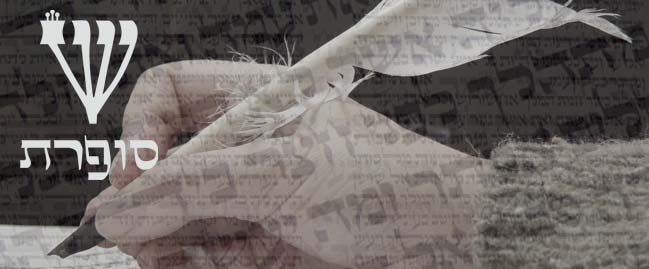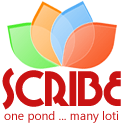CHULDA THE PROPHETESS...& SOFERET?
בס"ד
According to Talmud Bavli Yoma 29a, the letter Quf represents Chuldah HaNeviyah on it's list of 22 saintly women/alefbet correspondence table. She appears only in II Kings 22:14 & II Chron. 34:14-28, but she changes the course of Jewish history & that of the ancient theocratic kingdom of Israel. The letter Quf itself has the gematria of 100, which is that of the words Mem-Chet-Yud Tet-Bet-Alef-Lamed, or "mitigation of the one by the other". This fascinates me, because G@d's decree against Israel was mitigated slightly through Chuldah on account of the king's immediate effort to do teshuvah (repent).
The gematria of the name "Chuldah", feminine for "choled" (weasel), is:
Chet=8
Lamed=30
Dalet=4
Hey=5
is 47
This is the same gematria as Bet-Mem-Hey, which can be vocalized "bimah" or "bamah": cloud, fortress, high place, waves, stage, platform, pulpit, mound, altar, mesa, scaffold, rostrum....& that's where she prophesied & taught, at the "Chuldah" gates, the double-gate at the top of the 15 steps leading to the temple mount, just above the south-side miqva'ot. We cannot pass through these gates any longer, where we would ascend to the Har HaBayit on our pilgrimmages singing Shir HaMalot, as they have been walled up & debris thrown into the tunnels by others. There is also an idea that Chudah was Known as "weasel" due to her frequenting the tunnels...
47 is also the same gematria as "Yo'el", or Joel, the angel ruling the astrological Betulah/Virgo (which is my sign, but enough of the mushy stuff)...
In the Tanakh, only one woman is mentioned as someone who writes and it is davka the evil queen Izevel & her writing was a command to murder Navot the Carmelite. So there at least were literate women in our past, even if they happened to be evil...
Concerning Chuldah: other prophetesses are mentioned by name like Chuldah who lived during the time of King Yoshayahu and are mentioned in the Book of Kings. The scroll that was discoved in the Temple during the days of King Yoshayahu was brought to her in order to prove that it was an ancient scroll, which she did. The fact that the King chose her to verify that this scroll was written by the hand of Moshe Rabeynu (so the story goes), rather than ask a different prophet or even his own personal scribe, Shafan, shows she was one of the true writers or at least a soferet with ru'ach nevu'ah. [can't find sources given for this, still working on it]
This means that if Chuldah HaNeviyah were a soferet, she would predate HaSoferet from the books of Ezra & Nechemyah & possibly be the earliest record of a female scribal tradition in Judaism.
A known literary study by Harold Blom a few years ago raised the exotic theory that attracted much attention, that one of the sources of the Chumash and the Book of Samuel was written by the hands of a woman - a widow, according to him - since according to him there is a unique feminine style. One feminist scholar (I can't remember her name - can anybody help?) claims that Shir Hashirim was written by a woman, but it is a very controversial view.
The following is an excerpt from the LaG B'Omer list of our women representing each of the sefirot on Ritualwell.org. I was so pleased to see that LaG B'Omer is the day of counting the sefirot that Chuldah represents...enjoy it & keep Chuldah in mind this Thursday night when you "light your fire"...
"33. Hod shebeHod - The Glory within Glory
According to the Bible, the Israelite kingdoms that follow the rule of David and Solomon are plagued by godlessness. One righteous king of Judah, named Josiah, discovers that the high priest has discovered a sacred scroll in the Temple which teaches that God is angry because of the people's violations. But Josiah does not know if the scroll is authentically the word of God. Josiah asks a delegation of his royal officers to go to Chuldah, a prophetess who lives in Jerusalem, and find out from her whether he should govern according to the words of the mysterious scroll.
Chuldah, surrounded by the high ranks of the king's court, delivers her verdict: the scroll is authentic, and God plans to punish the people with exile because they have disobeyed God's word. But Josiah's lifetime will be peaceful, because he has humbled himself before God.
It is extraordinary that Chuldah, a woman, is not only a prophetess who is valued and respected by the king, but the first person in the Bible ever to canonize a text. The work Chuldah recognizes as God's word is probably Deuteronomy, the book of the Torah that promises exile in retaliation for the people's disloyalty. The rabbis of the Talmud ask why the king consults a woman when there are other great (male) prophets around, and concludes that it is because Chuldah is compassionate that the king asks her. Yet whatever the reason, it is clear that Chuldah begins a new kind of prophecy in Israel-- the process of reading and interpreting sacred text. Chuldah represents hod shebe'hod, receptivity within receptivity, prophecy within prophecy, for her prophecy allows Israel to experience the prophetic voice in a new way.
The thirty-third day of the Omer is also Lag B'Omer. Lag B'Omer is a minor holiday frequently celebrated with bonfires and with the cutting of the hair of young boys. Lag B'Omer marks a day when Rabbi Akiva's students stopped dying of plague, and celebrates the triumph of rabbinic Torah study. It also marks the yahrtzeit (death date) of Shimon bar Yochai, traditionally named as the author of the Zohar, a work of mysticism. It is appropriate that Chuldah be remembered on a day that is a celebration of prophecy."














0 Comments:
Post a Comment
<< Home